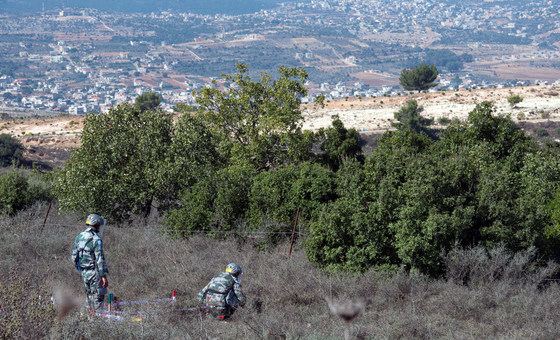The urgency of deescalating tensions along the frontier that separates Lebanese and Israeli armed forces, “cannot be overstated”, a senior UN humanitarian official said on Tuesday.
Since the start of the military operation by Israel in Gaza in October 2023, in response to the terror attacks by Hamas and other Palestinian armed groups, nearly 200,000 people have been displaced along the “Blue Line” between southern Lebanon and northern Israel.
A further 150,000 people remain within ten kilometres of the UN-patrolled frontier in areas of south Lebanon that are impacted daily by shelling and airstrikes, Imran Riza, UN Humanitarian Coordinator in the country told journalists in New York via video link from Beirut.
In the past week alone, 130 civilians were killed in Lebanon, including 21 paramedics and at least three journalists, he added.
“We keep repeating the message more needs to be done to end these hostilities, to find a diplomatic political solution, and immediately and continuously to protect civilians and humanitarian workers,” he said.
Challenging situation
Mr. Riza highlighted that even before the war in Gaza, Lebanon was on a downward spiral, marked by a protracted political, financial, and socio-economic crisis.
“Now, in 2024, those in need have reached 3.7 million people, including crisis-affected Lebanese, Syrians, Palestinians, and other migrants. The conflict has further eroded the capacity of the state to tackle political, economic and security challenges,” he said.
“People’s livelihoods have been devastated. Their access to water, electricity and healthcare has been affected. Children and parents are suffering psychological trauma.”
He added that humanitarians are responding to the needs of the displaced as well as those remaining in frontline areas, despite insecurity, access challenges and insufficient funding.
Resources needed
The senior humanitarian official also emphasized that despite limited funding – only about 25 percent of what is needed – UN and aid partners reached about one million people in need so far this year, including at least 180,000 people affected by the conflict in southern Lebanon.
“We continue to do our best to improve our ability to reach people in need, strengthening our coordination, prioritising our efforts to help the most vulnerable, negotiating access for assessments and distributions – but we need more resources and funding,” he stressed.
For the ongoing response to assist up to 290,000 conflict-affected people in the country, humanitarians require about $110 million between August and the end of the year, he added.
However, should there be a further escalation, they would need even more.
“In terms of preparedness right now, we are calling for an additional $36.4 million to pre-positioned food, water, medicines and non-food items such as hygiene kits and shelter materials for immediate use in case of escalation,” Mr. Riza said.

